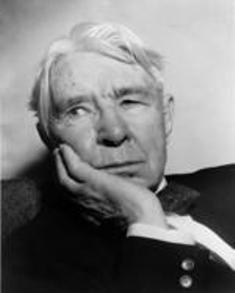
Eric A. Posner
Born: 1965
Pen Name: None Connection to Illinois: Posner is the Kirkland and Ellis professor of Law at the University of Chicago Law School. Biography: Eric A. Posner is Kirkland and Ellis Distinguished Service Professor of Law, University of Chicago. His most recent books are Radical Markets (with Glen Weyl), which was named a best book for 2018 by The Economist; and Last Resort: The Financial Crisis and the Future of Bailouts, which was named a best book for 2018 by The Financial Times. He is of counsel at MoloLamken LLP, a fellow of the American Academy of Arts and Sciences, and a member of the American Law Institute. He has written extensively for popular media outlets, including The New York Times, The Wall Street Journal, and The Washington Post, and testified before Congress.
Awards:
- "The Demagogue's Playbook"
- -- Editor's Pick. New York Times, 2020
Website: https://www.law.uchicago.edu/faculty/posner-e
Wikipedia: https://en.wikipedia.org/wiki/Eric_Posner
Selected Titles
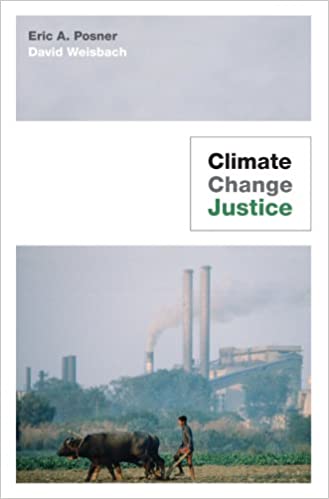 |
Climate change justice / ISBN: 0691137757 OCLC: 593295812 Climate change and justice are so closely associated that many people take it for granted that a global climate treaty should--indeed, must--directly address both issues together. But, in fact, this would be a serious mistake, one that, by dooming effective international limits on greenhouse gases, would actually make the world's poor and developing nations far worse off. This is the provocative and original argument of Climate Change Justice. Eric Posner and David Weisbach strongly favor both a climate change agreement and efforts to improve economic justice. But they make a powerful case tha. |
 |
Cost-benefit analysis : ISBN: 0226007626 OCLC: 45575386 University of Chicago Press, Chicago : 2001. Cost-benefit analysis is a widely used governmental evaluation tool, though academics remain skeptical. This volume gathers prominent contributors from law, economics, and philosophy for discussion of cost-benefit analysis, specifically its moral foundations, applications and limitations. This new scholarly debate includes not only economists, but also contributors from philosophy, cognitive psychology, legal studies, and public policy who can further illuminate the justification and moral implications of this method and specify alternative measures. These articles originally appeared in the Journal of Legal Studies. -- |
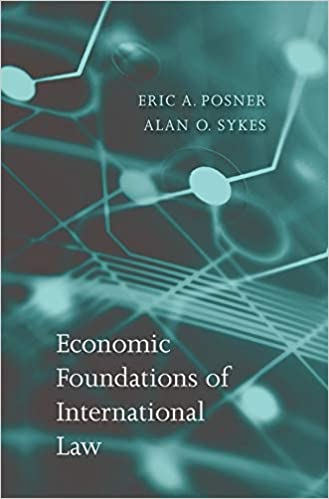 |
Economic foundations of international law / ISBN: 0674066995 OCLC: 819323261 "International law is a vast subject, and its importance is imcreasing. It is sufficient to point to the major role of international law in the conflicts and wars that emerged from the 9/11 terrorist attack and in international efforts to address climate change. These are two of the most important issues of our time. 'Globalization' has become a cliché, but it is undeniable that interactions among states have increased enormously over the last twenty years, and this has produced urgent questions for international law. This book provides an intellectual framework for thinking about these questions in a rigorous way"--Provided by publisher. |
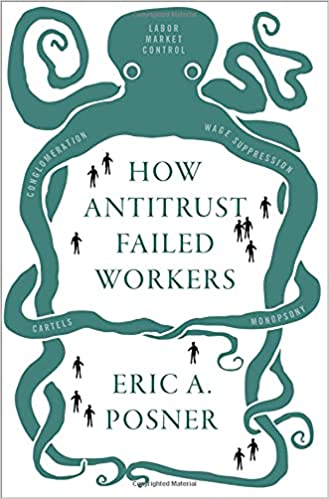 |
How antitrust failed workers / ISBN: 019750762X OCLC: 1243263280 Antitrust laws are traditionally used to attack monopolies like Facebook and Google which are able to either charge high prices or degrade the quality of their services because customers cannot switch to competitors. Antitrust laws are also used to attack cartels of businesses, which fix prices. But while antitrust law applies to anticompetitive behavior by employwers in labor markets as well, it has been rarely used in this way--despite substantial evidence that anticompetitive labor market practices have suppressed wages. In this book, Eric Posner describes how workers can use antitrust law. |
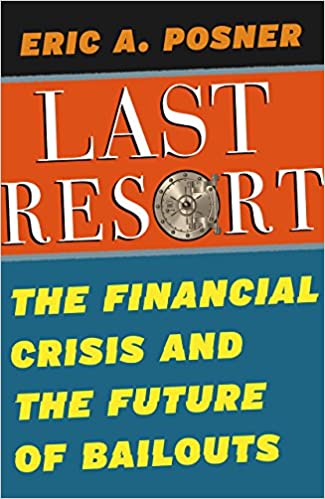 |
Last resort : ISBN: 022642006X OCLC: 984512043 Eric A. Posner argues that bailouts, like those that took place during the 2008-2009 financial crisis, have happened in the past and that they are both "necessary and unavoidable in any modern capitalist or market-based system." Posner analyzes bailouts from economic, political, and legal angles.--Provided by publisher. |
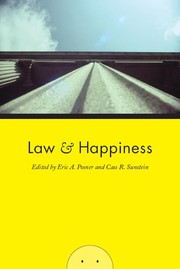 |
Law and happiness / ISBN: 0226676013 OCLC: 615629241 University of Chicago Press, Chicago : 2010. This book explores the rapidly developing area of research called hedonics or "happiness studies." Researchers from fields such as philosophy, law, economics, and psychology explore the bases of happiness and what factors can increase or decrease it. The results have implications for both law and public policy. |
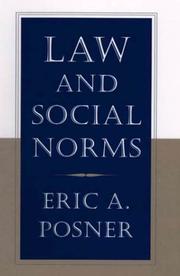 |
Law and social norms ISBN: 0674001567 OCLC: 42953036 Harvard University Press, Cambridge, Mass. : 2000. What is the role of law in a society in which order is maintained mostly through social norms, trust, and nonlegal sanctions? Eric Posner argues that social norms are sometimes desirable yet sometimes odious, and that the law is critical to enhancing good social norms and undermining bad ones. But he also argues that the proper regulation of such norms is a delicate and complex task, and that current understanding of them is inadequate for guiding judges and lawmakers. What is needed, and what this book offers, is a model of the relationship between law and social norms. The model shows that people's concern with establishing cooperative relationships leads them to engage in certain kinds of imitative behavior. The resulting behavioral patterns are called social norms.--Jacket. |
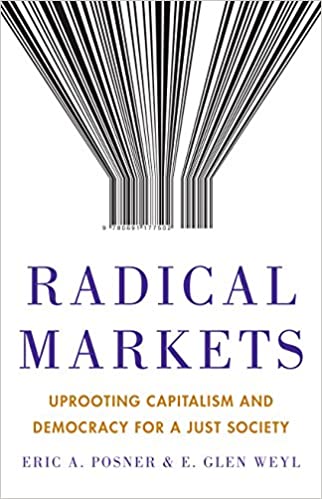 |
Radical markets : ISBN: 0691177503 OCLC: 1030268293 "Many blame today's economic inequality, stagnation, and political instability on the free market. The solution is to rein in the market, right? [This book] turns this thinking--and pretty much all conventional thinking about markets, both for and against--on its head. The book reveals...new ways to organize markets for the good of everyone. It shows how the emancipatory force of genuinely open, free, and competitive markets can reawaken the dormant nineteenth-century spirit of liberal reform and lead to greater equality, prosperity, and cooperation. [The authors] demonstrate why private property is inherently monopolistic, and how we would all be better off if private ownership were converted into a public auction for public benefit. They show how the principle of one person, one vote inhibits democracy, suggesting instead an ingenious way for voters to effectively influence the issues that matter most to them. They argue that every citizen of a host country should benefit from immigration--not just migrants and their capitalist employers. They propose leveraging antitrust laws to liberate markets from the grip of institutional investors and creating a data labor movement to force digital monopolies to compensate people for their electronic data. Only by radically expanding the scope of markets can we reduce inequality, restore robust economic growth, and resolve political conflicts. But to do that, we must replace our most sacred institutions with truly free and open competition--[this book] shows how."-- |
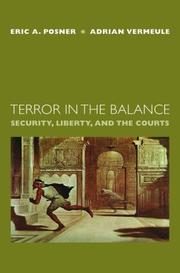 |
Terror in the balance : ISBN: 019531025X OCLC: 609351542 Oxford University Press, New York : 2007. Introduction. Part I: Constitutional Law and Theory. 1. Emergencies, Tradeoffs, and Deference. 2. The Panic Theory. 3. The Democratic Failure Theory. 4. The Ratchet Theory and Other Long-Run Effects. Part II: Applications. 5. Institutional Alternatives to Judicial Deference. 6. Coercive Interrogation. 7. Speech, Due Process, and Political Trials. 8. Military Force. Conclusion: Emergency Powers and Lawyers' Expertise. Notes. Index. |
 |
The demagogue's playbook : ISBN: 1250303036 OCLC: 1139014492 "Cuts through the hyperbole and hysteria that often distorts assessments of our republic, particularly at this time." - Alan Taylor, winner of the 2014 Pulitzer Prize for History What-and who-is a demagogue? How did America's Founders envision the presidency? What should a constitutional democracy look like-and how can it be fixed when it appears to be broken? Something is definitely wrong with Donald Trump's presidency, but what exactly? The extraordinary negative reaction to Trump's election-by conservative intellectuals, liberals, Democrats, and global leaders alike-goes beyond ordinary partisan and policy disagreements. It reflects genuine fear about the vitality of our constitutional system. The Founders, reaching back to classical precedents, feared that their experiment in mass self-government could produce a demagogue: a charismatic ruler who would gain and hold on to power by manipulating the public rather than by advancing the public good. President Trump, who has played to the mob and attacked institutions from the judiciary to the press, appears to embody these ideas. How can we move past his rhetoric and maintain faith in our great nation? In The Demagogue's Playbook, acclaimed legal scholar Eric Posner offers a blueprint for how America can prevent the rise of a demagogue and protect the features of a democracy that help it thrive-and restore national greatness, for one and all"-- |
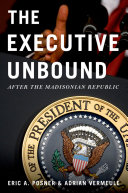 |
The executive unbound : ISBN: 0199765332 OCLC: 704383264 Oxford University Press, Oxford ; ©2010. "Ever since Arthur M. Schlesinger Jr. used "imperial presidency" as a book title, the term has become central to the debate about the balance of power in the U.S. government. Since the presidency of George W. Bush, when advocates of executive power such as Dick Cheney gained ascendancy, the argument has blazed hotter than ever. Many argue the Constitution itself is in grave danger. What is to be done? |
 |
The law of international lawyers : ISBN: 9781107193185 OCLC: 982287938 This book provides original perspectives on the work of one of the most important thinkers in international law today. |
 |
The limits of international law / ISBN: 0195314174 OCLC: 54913209 Oxford University Press, Oxford ; 2005. "In this book, Jack L. Goldsmith and Eric A. Posner argue that international law does matter but that it is less powerful and less significant than public officials, legal experts, and the media believe. International law, they contend, is simply a product of states pursuing their interests on the international stage. It does not pull states toward compliance contrary to their interests, and the possibilities for what it can achieve are limited. It follows that many global problems are simply unsolvable."--Jacket. |
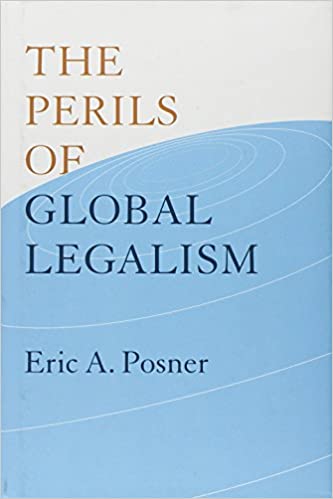 |
The perils of global legalism / ISBN: 0226675742 OCLC: 503831184 University of Chicago Press, Chicago : 2009. The first months of the Obama administration have led to expectations, both in the United States and abroad, that in the coming years America will increasingly promote the international rule of law--a position that many believe is both ethically necessary and in the nation's best interests. With The Perils of Global Legalism, Eric A. Posner explains that such views demonstrate a dangerously naive tendency toward legalism--an idealistic belief that law can be effective even in the absence of legitimate institutions of governance. After tracing the historical roots of the concept, Posner carefully. |
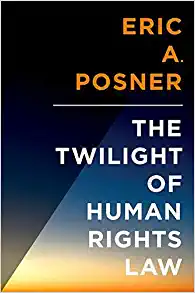 |
The twilight of human rights law / ISBN: 019931344X OCLC: 891449856 "Countries solemnly intone their commitment to human rights, and they ratify endless international treaties and conventions designed to signal that commitment. At the same time, there has been no marked decrease in human rights violations, even as the language of human rights has become the dominant mode of international moral criticism. Well-known violators like Libya, Saudi Arabia, and Sudan have sat on the U.N. Council on Human Rights. But it''s not just the usual suspects that flagrantly disregard the treaties. Brazil pursues extrajudicial killings. South Africa employs violence against protestors. India tolerate child labor and slavery. The United States tortures. In The Twilight of Human Rights Law the eminent legal scholar Eric A. Posner argues that purposefully unenforceable human rights treaties are at the heart of the world's failure to address human rights violations. Because countries fundamentally disagree about what the public good requires and how governments should allocate limited resources in order to advance it, they have established a regime that gives them maximum flexibility--paradoxically characterized by a huge number of vague human rights that encompass nearly all human activity, along with weak enforcement machinery that churns out new rights but cannot enforce any of them. Posner looks to the foreign aid model instead, contending that we should judge compliance by comprehensive, concrete metrics like poverty reduction, instead of relying on ambiguous, weak, and easily manipulated checklists of specific rights."-- |




